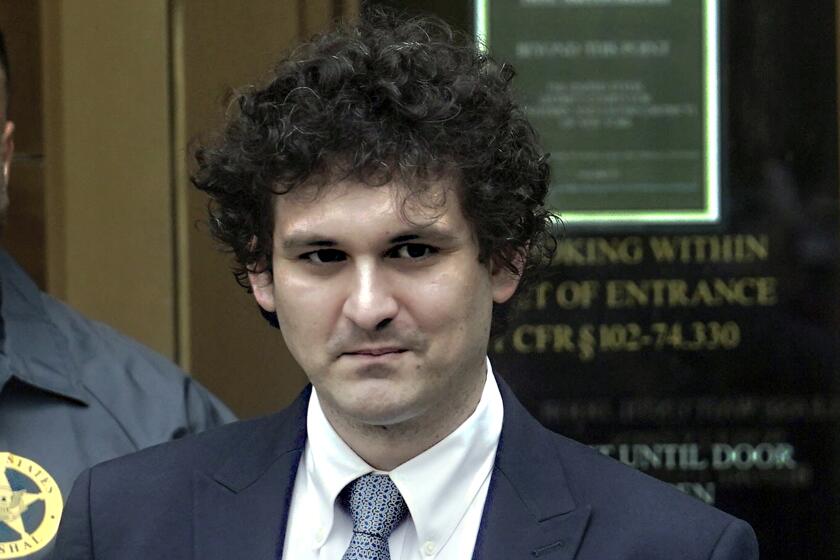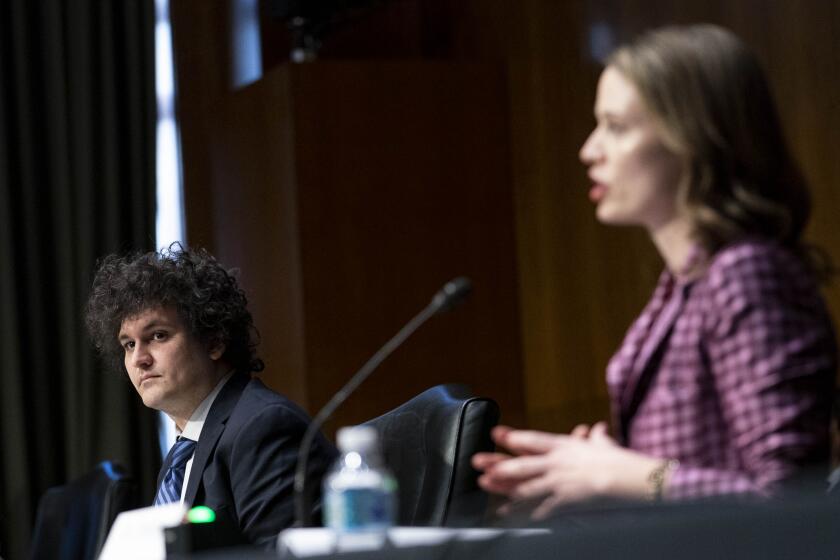Column: The crypto scam is on life support. Why are some lawmakers trying to give it CPR?

For crypto, November has been the cruelest month.
Things got started with a blast Nov. 2, when scam artist Sam Bankman-Fried was convicted on seven fraud and conspiracy counts related to his management of the once-upward scuttling crypto exchange FTX.
Matters didn’t get any better after that. On Nov. 20, the Securities and Exchange Commission charged the crypto trading platform Kraken with a raft of legal violations.
If virtual currency exchanges and financial technology firms wish to realize the tremendous benefits of being part of the U.S. financial system and serving U.S. customers, they must play by the rules.
— Treasury Secretary Janet Yellen
The SEC alleges that Kraken has been operating simultaneously as a crypto “broker, dealer, exchange, and clearing agency,” which present potential conflicts of interest that work against customers’ interests.
One day after that, the government dropped a nuclear bomb on the asset class. The Treasury, Commodity Futures Trading Commission and Department of Justice announced a $4-billion settlement of money laundering charges against Binance, the largest crypto platform still standing after the collapse of FTX.
Get the latest from Michael Hiltzik
Commentary on economics and more from a Pulitzer Prize winner.
You may occasionally receive promotional content from the Los Angeles Times.
(Interestingly, the one agency not participating in the settlement is the SEC, which makes it seem that its enforcers are intent on pursuing their own case against Binance.)
As part of the deal, Binance agreed to cease doing business in the U.S. and employ an independent compliance monitor for five years. Its founder, Changpeng “CZ” Zhao, agreed to step down as chief executive; he pleaded guilty in Seattle federal court to a felony money-laundering charge and agreed to pay a $50-million fine. Federal prosecutors are asking the court to sentence him to 18 months in prison.
Put all that together with a string of prior bankruptcies of crypto firms over the last year or so, and it’s impossible to escape the conclusion that as an asset class, crypto is so infected with criminal behavior and so lacking in useful purpose that the only proper regulatory approach is to eradicate it.
Sam Bankman-Fried gambled with a cryptocurrency scam and lost. His guilty verdicts make the rest of us winners.
(Put simply, crypto is a class of financial instruments, the values of which are set arbitrarily by their own promoters. They don’t throw off earnings like stocks or bonds; they don’t have industrial or commercial uses like gold or other precious metals; they can’t easily be used to buy goods or services, which might help to establish real-world values.)
Crypto adherents plainly fear that that’s the direction in which U.S. regulators are heading. Earlier this month, Kristin Smith, a leading crypto lobbyist, asserted that regulators’ efforts to define crypto trading firms as “brokers” for tax purposes would “surely spell the near-total collapse of the crypto industry in the United States.”
Would that be a drawback? Not in the eyes of Molly White, one of crypto’s most effective (and readable) public critics. Her response to Smith’s comment was: “Don’t threaten me with a good time.”
Despite the mounting evidence that the cryptocurrency business is, at its heart, a scam, it does have some powerful defenders in Washington. Nine House members — three Democrats and six Republicans, led by Rep. Patrick McHenry (R-N.C.), chair of the Financial Services Committee — groused to the Treasury in a Nov. 10 letter that its proposed regulations would “inhibit innovation and harm the digital asset ecosystem.”
In a servile bow to the crypto industry’s self-interest, they asserted that the proposed tax regulation would “prevent a large swath of the digital asset ecosystem from continuing to exist in the United States.”
What motivated their appeal? Quite possibly, money. Crypto firms have been pumping lobbying funds into Washington and campaign donations to politicians as if through a fire hose. From 2020 through mid-November this year, the industry spent more than $53 million on lobbying in the capital.
As of 2022, several of the nine signatories of the Nov. 10 letter were among the top recipients of industry campaign donations: McHenry, the recipient of $110,170 in career contributions up to that point, ranked fifth among all representatives and senators in crypto industry donations.
Democratic Rep. Ro Khanna of California and Democratic senators Charles Schumer of New York (the Senate majority leader), Ron Wyden of Oregon and Kirsten Gillibrand of New York all outraised McHenry; all are known to favor some sort of carve-out for crypto from traditional securities regulations.
The essence of the industry’s pitch to lawmakers is that allowing its firms to operate with minimal government oversight will encourage financial innovation to take place on these shores, rather than overseas.
Government agencies are moving to crush crypto as a hive of ‘fraud and scams.’ Congress should stay out of their way, and investors should take note.
The core assumption is that “innovation” as the industry defines it is in the public interest. A delegation of crypto executives and lobbyists will be spreading over Capitol Hill on Tuesday to make that case to any lawmakers willing to meet them.
“We ... stand ready to build toward a future where this technology delivers maximum benefits to society while enhancing U.S. national security,” the Blockchain Assn., the industry’s lobbying arm, wrote in a Nov. 15 letter to key representatives and senators.
The association assured the lawmakers that, notwithstanding ample evidence of criminality in the industry, “transactions involving illicit digital asset addresses represent a very small fraction of total transaction volume.” On the plus side, it wrote, “We now have the ability to transfer value instantly and inclusively around the world without intermediaries or gatekeepers.”
The association asserts that its technology “has attracted mostly good actors looking to build applications for mainstream use.”
A couple of pertinent points about these claims: First, the “intermediaries and gatekeepers” crypto promoters say they can circumvent are frequently government treasuries and financial regulators responsible for protecting their national capital reserves or protecting domestic investors. In effect, the Blockchain Assn. is fessing up to crypto’s ability to dodge the law.
Second, the truth is that despite years of trying to make a case for the utility of crypto and its underlying technology, blockchain, the “value proposition” remains elusive. The association’s letter cites a collection of case studies in useful applications provided by Stellar Development Foundation, a promoter of blockchain networks.
A close look, however, suggests that these case studies tend to concern incompletely-baked ventures operating on limited scales. One, dubbed “Decaf,” claims to help “Venezuelans, Argentinians, Colombians and Nigerians convert their fiat [that is, official government currency] into crypto in order to prevent devaluation and safeguard their money from physical threats.”
Yet one of the unresolved issues with crypto is its volatility. Just in the last month, according to Coinbase, the price of bitcoin, the most widely followed crypto currency, suffered a plunge of 8.5% from Nov. 9 to Nov. 14, a drop of 4.5% over the six days following Nov. 15 and 4.4% over the Nov. 24-Nov. 27 weekend.
Those sudden bear raids were interspersed with price spikes, but no holders or traders of bitcoin could be remotely confident that they knew how much their holdings were worth at any given moment — or how much in goods or services they could buy.
Fiat currency systems are hardly perfect, especially in countries exposed to high inflation or fiscal crises (such as Venezuela, Argentina, Colombia and Nigeria). But no one has yet made the case that crypto is consistently, reliably or legally superior.
Column: Shame, suicide attempts, ‘financial death’ — the devastating toll of a crypto firm’s failure
Customers of the bankrupt Celsius reveal how the cryptocurrency firm’s collapse upended their lives.
What remains are cases in which crypto is unmistakably inferior. Its supposed virtues almost always tend to reveal themselves on closer inspection as drawbacks.
No intermediaries or gatekeepers? Who besides lawbreakers want their transactions to go utterly undetected by third parties? And without gatekeepers, who is empowered to guarantee or safeguard crypto valuations? Crypto transactions are said to be irreversible, but that’s a liability for holders who have been scammed or robbed and are told there’s no one to turn to for recourse.
The recent cases brought by U.S. regulators point to crypto’s usefulness chiefly for evading the law. The SEC, in the lawsuit against Kraken it filed in San Francisco federal court, said that the platform has been taking billions of dollars in fees and trading revenue from customers “without adhering to or even recognizing the requirements of the U.S. securities laws that are designed to protect investors.”
The SEC accuses Kraken of commingling customer funds with its own, using tens of millions of customer funds for its own purposes. The risk is that when customers seek to withdraw their money, it might be tied up in Kraken obligations or “gone completely.” Investment firms that are legally registered, the SEC says, aren’t allowed to commingle customer funds this way. Kraken told me by email that it considers its operations to fall outside the SEC’s regulatory authority and that it plans “to vigorously defend our position.”
As for Binance, U.S. authorities said the firm “pretended to comply” with U.S. laws, in the words of Atty. Gen. Merrick Garland, while deliberately flouting those laws. It facilitated illegal financial transfers between Americans and sanctioned countries such as Russia and Iran.
Treasury Secretary Janet Yellen said that financial transactions the firm facilitated supported “activities from child sexual abuse, to illegal narcotics, to terrorism.” The entities served by its transactions included “terrorist groups like Hamas’s Al-Qassam Brigades, Palestinian Islamic Jihad, Al Qaeda, and ISIS,” Yellen said.
This behavior allowed Binance to become the world’s largest cryptocurrency exchange. But it was always clear that it was operating on the fringes of legality. Zhao himself kept to a series of international domiciles, apparently most recently in Dubai; the headquarters of the firm itself have been hard to pin down. In becoming the largest crypto platform, Binance ended up attracting what Yellen called “the largest enforcement action in Treasury’s history.”
For all that crypto promoters love to claim that their tokens and networks are innovative alternatives to traditional financial systems — supplanting trust in government regulation with a sort of transparent self-trusting system — these cases make clear that they can’t be trusted to serve their legitimate users’ interests without some sort of government oversight.
None of the wrongdoing charged to crypto promoters such as Bankman-Fried, Zhao and the Kraken gang would have been possible in a market with established value benchmarks such as stocks, bonds and metals — their claims could always be measured against the benchmarks, and any discrepancies would soon become evident. That’s not to say that established markets are immune from swindling, only that markets without benchmarks lend themselves to some of the alleged activities.
That still leaves open the question of what variety of regulation is needed over crypto. The industry maintains that its uniqueness warrants a unique new type of oversight, which boils down to less oversight than any other asset class receives.
The recent cases put the lie to that claim. Existing laws and rules have proved to be perfectly adequate for policing the crypto market. Bankman-Fried got convicted on garden-variety fraud and conspiracy charges, Zhao and Binance on anti-money-laundering laws right off the shelf; Kraken is being sued for violating securities regulations in existence in one form or another since the 1930s.
Yellen perhaps said it best at the press conference following the Binance settlement: “If virtual currency exchanges and financial technology firms wish to realize the tremendous benefits of being part of the U.S. financial system and serving U.S. customers, they must play by the rules.” No new rules are needed, because to cite Ecclesiastes: When it comes to financial crime, as in all things, “there is nothing new under the sun.”
More to Read
Get the latest from Michael Hiltzik
Commentary on economics and more from a Pulitzer Prize winner.
You may occasionally receive promotional content from the Los Angeles Times.














